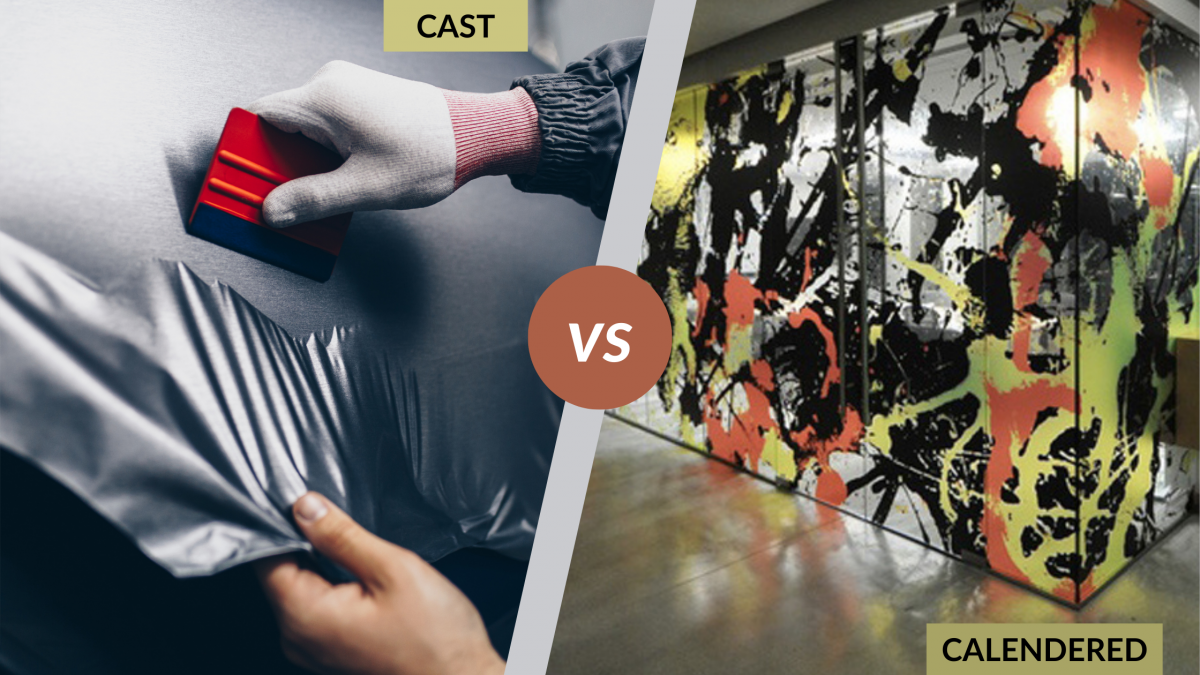Do you know the differences between cast and calendered vinyl? Read this article so you'll be prepared to choose the right vinyl for your next job.
Manufacturing Process of Cast and Calendered Vinyl
Cast and calendered vinyl both start off with a PVC, a type of plastic, as their main ingredient. Different plasticizers are then added in order to make the plastic flexible.
Cast and calendered vinyl are made with either polymeric or monomeric plasticizers. Polymeric plasticizers are a higher quality and result in long lasting high performance vinyl, while monomeric plasticizers are a lower quality and produce an economy grade vinyl that degrades more quickly over time.
Calendered vinyl is an intermediate or economy grade vinyl and works well for many applications. Cast vinyl is a premium grade vinyl made with high quality plasticizers and is much thinner and stretchier than calendered vinyl. It is also highly conformable, more dimensionally stable, and has a longer life.
Calendered vinyl will work perfectly for many applications, but for some jobs cast is the better choice.
Cast Vinyl
The more dependable vinyl of the two is cast vinyl, which is used for the most demanding jobs. When wrapping a vehicle, cast is the way to go if you want a wrap that will look good and last long without cracking and peeling. Due to the manufacturing process and chemical makeup, cast vinyl is thinner and conforms well to complex curves and rivets and offers the best reassurance on quality.
Cast vinyl is more expensive than calendered vinyl, which is why it is not used for all jobs.
Manufacturing Process:
Cast starts off as a liquid, kind of like paint. It is then spread onto sheets and sent through a series of ovens where the chemicals evaporate leaving a thin film behind. Cast vinyl can be as thin as 2 mil, and is very stretchy which makes it excellent for car wraps and other complex applications.
Cast Vinyl Benefits:
- Much thinner so it conforms well to complex curves and rivets
- Very durable- average lifetime of 5-12 years
- Less shrinkage because it isn’t stretched in the manufacturing process
- Maintains color
- Doesn’t crack
Applications:
Complex surfaces with rivets, curves, and corrugations, especially vehicle wraps and architectural wraps, long term outdoor signage, and high demanding applications
Calendered Vinyl
Calendered vinyl is perfect for indoor applications on flat surfaces and simple curves, like walls, floors, and window graphics. It is also suitable for short-term outdoor applications like bus kings, queens, and full bus wraps.
Manufacturing Process:
Calendered vinyl starts off firm and is extruded through a machine in a process called calendering. It is rolled and stretched into thin sheets as it moves through the machine. Once it cools down it is wound up on rolls.
Because calendered vinyl is stretched during manufacturing it is always trying to revert back to its original state, which makes it more prone to shrinkage and cracking. You don't want to use calendered vinyl for car wraps or even vehicle lettering where shrinkage will look bad.
Though with recent advancements in manufacturing, some calendered vinyl is slowly reaching the high level of quality that cast is known for and can last more than 5 years outdoors. Check out the "cast killer", a high conformable calendered vinyl that even Nascar drivers use for their car wraps.
Calendered Vinyl Benefits:
- Thicker and easier to handle especially for novices
- Cheaper than cast
- Great for flat or slightly curved surfaces
- Less abrasive
Applications:
Floor graphics, window decals, cut and apply letters, short-term graphics, full wall wraps, POP displays
Choosing the right vinyl for the job
Cast vinyl will give surfaces the look and feel of paint, making them great for vehicle wraps. For short-term applications on flat surfaces, use calendered vinyl.
If you use the right vinyl for the job, you’ll get the most out of your investment. Don't use cheap vinyl when more expensive vinyl is needed, and certainly don't spend extra money on higher end vinyl when economy grade will do.
Our Recommendations
Cast Vinyl
- Avery SW900 Supreme Wrapping™ Film with durability up to 12 years
- Avery Dennison MPI 1105 SuperCast Series
- DigiJet Nova Cast vinyl and overlaminate
Calendered Vinyl
- Avery PC500 an intermediate vinyl in 30 high gloss colors for short-term applications
- DigiJet 930 "cast killer" vinyl and Digi-Lam 631 overlaminate
Conclusion
Cast and calendered vinyl are both great at what they do. While calendered vinyl is economical and budget friendly, and perfect for flat surfaces, minor curves, and short-term applications, cast is higher end, as thin as a new coat of paint, and will last much longer.
If you use the right vinyl for the right job, you'll be happy, your customer will be happy, and the vinyl will be happy being used for what it was made for.
Have any questions? Give us a call at 718-399-3333 or email us at [email protected]. We're here to help!
At S&F News, our mission is to keep you informed on the latest industry trends and tips. Check back often for updates.

